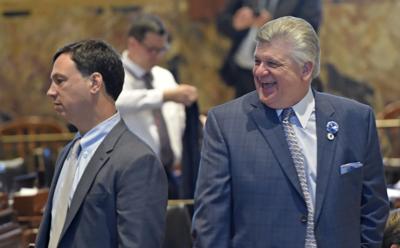Legislating during an election year is often one part theater and one part governance. The just-concluded drama over whether lawmakers would roll back the sales tax they approved just last year certainly fits the first category, right down to a predictable, tried-and-true plot.
Of course, Republican ideologues in the House would insist the government, led by a Democratic governor, is simply taking in too much money, and vote to undo what they just took 10 sessions over three years to do in the first place.
And of course they’d take that vote knowing that the Senate, which is also majority Republican but is more closely aligned with Gov. John Bel Edwards, would kill the measure — thus enabling the 73 House members who voted “yes” to boast of having opposed taxes without having to own the logical consequence of unpopular cuts to health care and higher ed.
The Senate Revenue and Fiscal Affairs Committee drew the curtain on Alexandria state Rep. Lance Harris’s bill Wednesday when it voted it 6-2 to kill the measure for the session. The committee has a Democratic majority, but surely the full Senate would have done the same, and if not, Edwards would have vetoed the measure. Probably many of the House members who voted for the bill are fine with this resolution. After all, they lived through three years of fighting over how to steer the state away from the fiscal cliff that former Gov. Bobby Jindal and the prior Legislature left behind, and many of them held their noses, did the responsible thing and backed the seven-year, .45 cent sales tax that finally stabilized the budget.
That vote will probably wind up being the most consequential of the four-year term, even though there have been numerous efforts to obscure it.
There was the debate, which continues, over whether it should be called a tax cut or a tax increase. Edwards claims the former, on the grounds that the tax rate is lower than the temporary, full cent that he signed in 2016, which was supposed to give everyone time to come up with a more comprehensive tax restructuring that never happened. His critics favor the latter interpretation, because the new tax rate is higher than it would have been had lawmakers simply let the one cent expire (the .45 tax is temporary as well, but it is set to last seven years, beyond a possible second Edwards term).
There was the vague claim by House Speaker Taylor Barras, R-New Iberia, that revenues might fall short of economists’ predictions anyway, which was Barras’ rationale for taking the unprecedented step of delaying an official income estimate for months, a move that had political posturing written all over it.
More recently, there was Harris’s insistence that the state’s income was too high, not too low, and that rather than use the money to invest in long-deferred priorities, the just-passed tax should be gradually reduced. Harris, who heads the House Republican caucus, didn’t vote for the measure last year but did participate in negotiations over the precise tax rate, and it goes without saying that the bill couldn’t have passed without plenty of GOP support.
In beating Harris's current bill back, one senator, Lafayette Democrat Gerald Boudreaux, said: “I think it’s ill-timed to bring a bill after one year.”
In other words, we’re right back where we started after lawmakers finally took that crucial vote. The budget is stable, services are funded, and there’s no sign that most Louisianans are up in arms over paying a fraction of a penny more at the cash register.
Maybe next time we can do this without all the play-acting.



